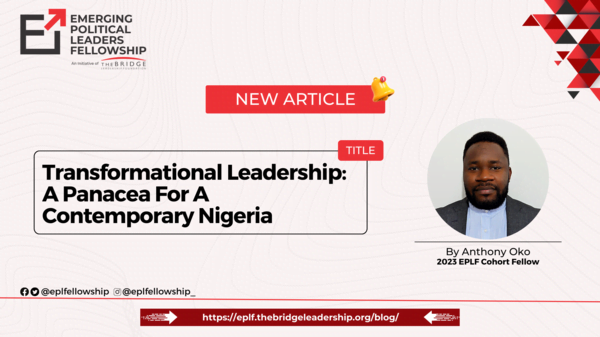By Anthony Oko, EPLF 2023 Cohort Fellow
Leadership holds a crucial position in driving progress and fostering growth, particularly in the realms of nation-building and human management. The process of selecting and appointing leaders within a defined population is intricate, encompassing a range of complexities dictated by established laws and norms. The creation of rules, norms, and laws by people aims to establish a clear regulatory framework for coexistence. It is essential for these laws to manifest in the lives, actions, and inactions of society members for whom they were designed. Ultimately, an individual is entrusted with the responsibility of assuming leadership, serving as an example, benchmark, and role model for the administration of these laws.
In essence, the leader is the most outstanding and exemplary member within a defined population or group. They are entrusted with the crucial role of leading, guiding, and exercising control, while also making the most sensible decisions on behalf of the other members, often referred to as followers. The leader serves as the symbolic representation of the entire group, holding legitimate recognition and the privilege to act, represent, and advocate for all other members.
Within the Nigerian context, the democratic leadership system was designed and implemented to mirror the nation’s diverse nature and represent the entirety of its population. However, it raises the crucial question: Has Nigeria’s democratic leadership structure effectively served and advanced the country? Has it truly embodied the principles of democracy, permeating through economic, political, and socio-cultural practices? Does it align with the visions and aspirations of Nigeria’s founding fathers, ancestors, and the expectations of its present-day citizens?
Undeniably, Nigeria operates as a democratic nation, yet the true challenge lies in effectively propelling the machinery of democracy. While we have established institutions and developed the appropriate framework for democratic governance, we have struggled to ensure capable leaders assume the reins of power within these institutions. Just as a pilot operates an aircraft and not a car, and a driver handles a car rather than an aircraft, leadership roles require individuals with specific expertise and experience. This concept underscores the need for transformational leaders.
The transformational leader is experienced, endowed, a good listener, a good speaker, an excellent problem solver, an impacting and effective member of society, a good follower, and an inspiriting and inspiring representative. He has the character and charisma to get things done with minimal issues and concerns, he possesses the acumen to make the right decisions and public good conclusions. The transformational leader feels the pain of the people, wears the shoe of pain with them to know exactly where to get issues sorted, interacts with the people, and works with the people, for the people, and accounts to the people. He is transparent, accountable, reliable, trustworthy, and articulate. The person of these qualities defines the demands of transformational leadership which is ideal for a contemporary Nigeria.


Comment (1)
Well articulated and inspiring message…
Comments are closed.